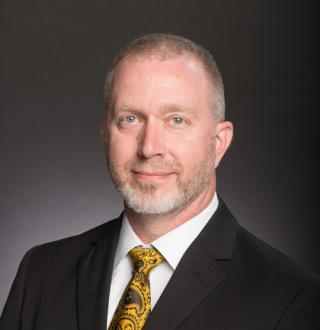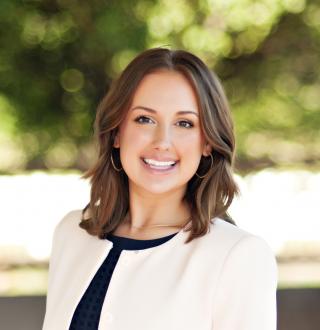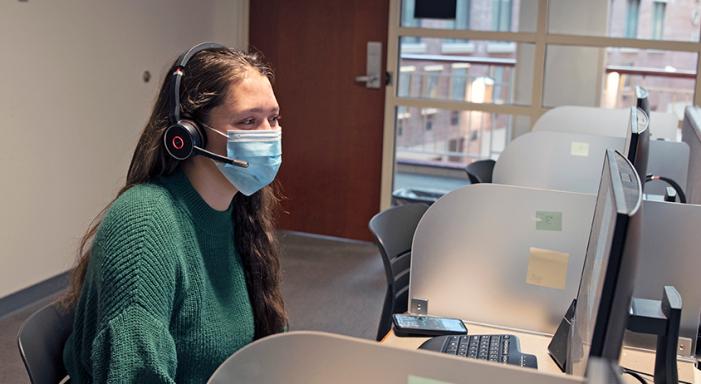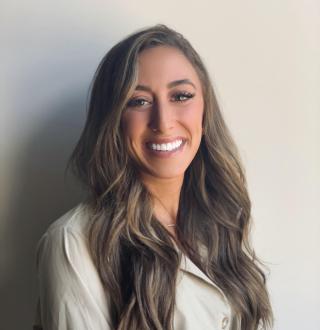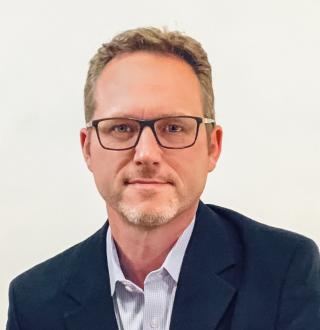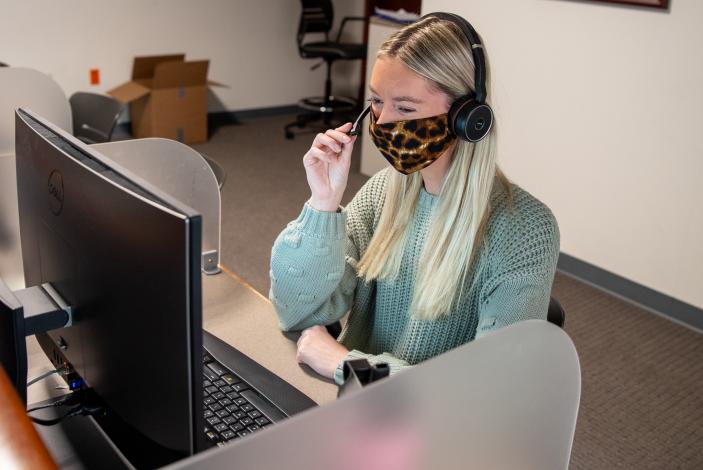
Learning on the job: Trulaske students gain real-world marketing experiences through Inside Sales Lab

By Stephen Schmidt
The class fit her schedule, so she signed up on a whim. What Natalie Gilliam, BS BA ’20, did not realize was that the personal selling class taught by Wayne Keene, associate teaching professor of marketing, would help her find a career that fit her skillset — and later, her life.
“It was the best accident I've ever been part of,” Gilliam said.
In the spring 2019 semester at the Gilliam was a junior not exactly sure what the next step looked like after her time at the Trulaske College of Business, and at the University of Missouri in general, had drawn to a close.
Then fate stepped in. After watching her act out a sales role-play scenario in front of the class, Keene told her that he had a ticket with her name on it for the Twin Cities Collegiate Sales Team Competition taking place in a few weeks at the University of Minnesota-Twin Cities. The competition featured students from more than 20 universities attempting to role play sales scenarios behind closed doors for both a large and small company with judges watching in the background.
“It was something that I've been around a lot with my parents, who had done sales all their lives. He said, ‘You have to come. You're really a natural at this.’ So I went,” Gilliam recalled of her conversation with Keene.
In spite being one of the few non-seniors in Mizzou’s delegation, Gilliam recorded the highest individual score on the team, which finished the third most points in the competition.
Shortly thereafter, Keene found a spot for Gilliam in the burgeoning Inside Sales Lab, located on the third floor of Cornell Hall. Sitting at one of nine terminals inside the space, Gilliam started her time as a remote paid intern working for a nationally known foodservice sales agency, The CORE Group, focusing on McCormick & Company and Smucker’s.
In January of 2020, Gilliam transferred to the Central Missouri-based Quaker Windows and Doors to play a key role with a fellow student in the Inside Sales Lab in moving the company’s customer database from a construction-specific customer relationship management (CRM) platform to the widely used Salesforce.
After graduating from Trulaske in 2020, Gilliam started work as a technical recruiter for St. Louis-based Signature Consultants, before accepting her current role as a business development representative for the mobile payment company Square last November.
She gives a large amount of credit for the fast ascension of her young career to the experiences she had while working in the Inside Sales Lab. Inside sales, also known as virtual sales, have become the fastest growing segment of the entire sales profession. As a more cost-effective alternative to the traditional role of the traveling “outside” sales representative, inside sales teams create and strengthen partnerships between companies and possible clients in every business-to-business, or B2B, sector.
Trulaske’s Inside Sales Lab houses 15 Mizzou students, most of whom are juniors and seniors, working for four different customer companies. Like Gilliam, the students either assist with the sales process by finding and executing leads, or may even have the opportunity to close on sales themselves — depending on the expectations of the customer companies. To date, close to 40 students have worked for 10 companies as part of the lab.
“Whenever you come out of college, and you can say, 'I've cold-called people before. I've made 100 calls a day. I can smile and dial all day long.’ People are like, ‘OK, there's more of an investment here rather than a risk,’” Gilliam said. “It's made me incredibly marketable."
An idea grows sprouts
The origins of the Inside Sales Lab date back to conversation that Keene had several years ago with Mike Baker, BS BA ’98, the
senior vice president of channel solutions at The CORE Group, who also serves on the Marketing Department Advisory Board.
The two were brainstorming about how Trulaske and Baker’s company could increase involvement with each other. Shortly thereafter, Niladri Syam, senior associate professor of marketing at Trulaske, joined in on the chain of dialogue that centered around the idea of an inside sales lab.
Simultaneously, Keene had another similar conversation with a sales operation manager at UPS.
“They wanted to hire some more of our students,” said Keene, who also serves as the founding director of the Center for Sales and Customer Development (CSCD). “And I broached this germinating idea of the Inside Sales Lab. He said, ‘Well, actually, we have a lot of inside sales folks. We need to train our associates how to do inside sales, and we have some things that we just haven’t been able to get to, so that would be an interesting idea for us.’”
Keene’s first professional job was in inside sales for now-defunct Laclede Steel in St. Louis in the late ’90s, so he had practical experience in the field and had developed a proactive inside sales system. His real-world applications paired seamlessly with the academic pursuits of Syam, who has devoted his academic career to researching artificial intelligence, CRMs and other related sales-centric analytical mechanisms.
After being granted permission to use a space in Cornell Hall that had formerly been a simulated trading floor, Keene and Syam began a six-month process of negotiating with potential partner companies to hammer out an arrangement that would work for all parties.
Eventually, a plan came into place in which the student interns earn credit while being paid for their time, which usually ranges from 15 to 20 hours a week. In addition, the companies have also provided funding to Trulaske for update of the physical Inside Sales Lab space, which includes eight computer stations, ergonomic chairs and a supervisor station.
Before the COVID-19 pandemic, several students would work in the Inside Sales Lab at once. Now, students take turns being in the lab based on a daily schedule. Keene noted the recent addition of a call center software program called TalkDesk has enabled them to manage the COVID-related physical space restrictions, while enabling more partner capacity scalability and greater efficiency with call-related research data.
Although Keene and others could never envision the scenario that the virus has created across the globe, he does realize the increased relevance that a remote lab has in today’s working conditions.
“We thought we were getting out ahead of looming budget constraints concerning the expensive nature of outside sales,” Keene said. “But what we actually were getting out ahead of was a global pandemic that forced everyone to be in inside sales. So the skills that we're teaching now are going to be in high demand.”
Added Syam: “COVID-19 hasn’t really affected our operations. This is because many companies have been trying to emphasize the inside selling aspect, which is what the Inside Sales Lab does, ever since COVID-19 made the traditional ‘outside selling’ more difficult.”
‘They had confidence in me’
Ali Lawson, BHS ’15, can speak firsthand about the demand of those skills.
Currently, Lawson works as an account executive for Med-Lab Supply Co. Inc., primarily selling Siemens medical imaging equipment to more than 20 hospitals located South Florida.
Before arriving in West Palm Beach in September, though, Lawson spent close to five years working for Cassling — a Siemens medical imaging equipment distributor based out of her hometown of Omaha, Nebraska — as an account management executive, and later as an account executive. She had first served as a sales intern for the company in the summer of 2015, after having earned a Certificate in Sales and Customer Development through the CSCD that same year.
Several years ago, Lawson found herself in a meeting with her fellow Cassling colleagues talking about how to improve its inside sales capability. Lawson had just returned from a trip to Columbia, and heard about the initial efforts of the Inside Sales Lab.
“We were just trying to strategize about ways that we can cover the market better,” said Lawson, who had taken Keene’s personal selling class on her way to earning one of the first certificates in sales and customer development from Trulaske in 2015. “I brought it up to a few people at my company, and then it went from there.”
Now Cassling is one of the five companies that currently are working with the Inside Sales Lab, employing five students.
Given her age and her sustained level of noteworthy performance in the inside sales field, Lawson had been asked many times about the secret to her success by fellow associates.
“I told them that I got basically a sales minor in college,” Lawson said. “And every person I've told that has never heard of that type of certificate, so it is not common at all. And it's definitely something that has stood out on my résumé.”
In ideal candidates, Lawson said, companies are looking for true business-to-business sales experience, not traditional retail sales — a rarity to find from a college student.
“I think it was definitely something that helped land this role, too,” Lawson said of her current employer. “They had confidence in me because of my education and my experience.”
After helping lay the foundation between Cassling and the Inside Sales Lab, Lawson made several visits in pre-COVID times to speak with Mizzou students in the lab with similar career aspirations to her own.
“It is such a cool experience to be able to see what these students have at their fingertips, and what they can take from it, and what they can do right out of college,” she said.
Making the most of one’s time
What students in the Inside Sales Lab have in resources and software, they often lack in time when it comes to cultivating the sales process with the person on the other end of the line, who is often a C-suite member — and thus, a top decision maker — at a company.
“A lot of them don't have 20 or 30 minutes to sit down and speak with you. They don't know who you are. You're a stranger to them, So I think the biggest thing I've quickly learned is that cold calling is a numbers game overall,” said Jack Sieber, a senior from St. Louis who has worked in the Inside Sales Lab as a representative of Ferguson Enterprises since the start of the fall semester.
“So you do need to make a lot of phone calls, but you also have to have that good hook and get your point across quickly and efficiently. It is the number one thing to do, because if you beat around the bush, it's just a waste of time.”
Sieber has been familiar with the Ferguson brand for most of his life, having grown up with parents who run a residential construction and renovation contracting business. The Ferguson he knew dealt primarily with plumbing supplies and HVAC parts. The Ferguson he tries to guide the conversation to when speaking to the upper management at senior care centers produces personal protective equipment — a venture that, like many other manufacturers, is a response to the pandemic.
“Make sure you get across what your what your point is, what the objective is for the call, why you are there and how you are going to help them in their current situation,” Sieber said of his mission when picking up the phone. “You have to be there to help them, not to sell them.”
Building a brand
Mark Schlimme, BJ ’90, serves as the vice president of marketing for SCREEN GP Americas. Although the Japanese-founded company has been in the American market since the ’50s as a precision equipment manufacturer, its experience selling its product directly to customers only dates back to 2007. Up until that point, SCREEN would sell products through original equipment partnerships and against other brands that traditionally have held more clout in the collective consciousness of American business owners.
“These are names that, even if you're not in our business, you know where or who they are. When you have that name on your business card, or on your email address, and you're trying to connect with an owner of a company, you don't have to cross that bridge of ‘Now, who are you guys? What are you doing? How long have you been around?’” said Schlimme, whose company began employing five interns in the Inside Sales Lab at the start of the fall semester.
The students in the Inside Sales Lab who work on behalf of SCREEN serve as a means to help build that bridge by conducting brand awareness surveys to glean data surrounding key markets and evaluate the overall perception of the company. They do so by accessing a list of top-level decision makers that Schlimme and his colleagues have built over the years.
“It's a great experience for a business school student to talk to decision makers —getting through some gatekeeping, overcoming some initial objections, and learning very quickly how to engage someone who doesn't have a lot of time and wasn't necessarily expecting their call,” Schlimme said.
In an ideal cycle, the interns would reach out to the customers on a quarterly basis, as their comfort with his company grows.
“If the interns can help seed our brand or pre-condition our prospects, then the chances of my direct sales team gaining an audience when they do call greatly improve,” Schlimme said. “And if we can get a meeting, then it's up to the sales team to close the deal.”
So far, Schlimme has been impressed with what he has seen from the interns representing his company, adding that future plans including deploying sales interns in more direct prospecting activities.
“These students are eager,” he said. “They’re innovative. They’re creative. They've got energy.”
In addition to their duties with the client companies, interns also collect data that should open up “invaluable research opportunities,” according to Syam, and possibly lead to more insight into overall inside sales strategies, and several academic papers to be published in the top marketing journals.
“The data that we can capture in the Inside Sales Lab will be truly unique,” Syam said. “I am not aware of any other university sales center that has something like this.”
And those selling hooks? They are not just for potential customers — when it comes to why Trulaske students should check out working for the Inside Sales Lab.
“Don’t second guess it. If the opportunity's there, take it. It's not going to hurt you. It's only going to better you,” Sieber said. “And once you're in that position, don't give up. It might be tough at times, but it's just a learning experience. You will get better over time with practice.”
And then there’s that whole getting-paid-while-learning aspect.
“You will have the most fun,” Gilliam said, “ and make the most money you’re ever going to make in college.”
